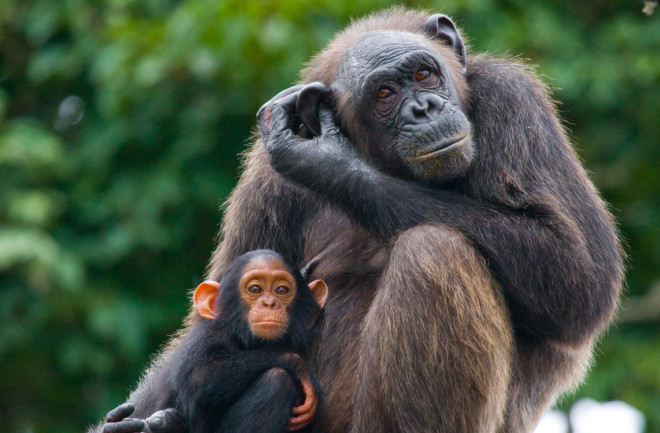Arguably, one of the defining features of humanity is our curiosity. We’ve built microscopes to peek into the world of the very small, and we’ve built telescopes to see the world of the very large.
And though the natural world is often the subject of our curiosity, so are other people — and even ourselves. When someone tells you they have a secret, for example, you can’t help but wonder what they might be concealing.
But is our propensity for curiosity really that unique? Isn’t curiosity exercised, in some way, by all manner of creatures and critters? In a new study, a collaborative group of researchers from Germany and the U.S. set out to try and answer this question.
Read More: How Similar Are Humans and Monkeys?
The Inquisitive Curiosity of Apes and Infants
The researchers presented 29 great apes (15 chimpanzees, 3 gorillas, 6 bonobos and 5 orangutans) with a series of choice experiments. In the first study, the apes chose between an empty, opaque cup and an opaque cup baited with invisible rewards.
In the second and third studies, our great ape relatives were tasked with choosing between a transparent cup — with visible rewards — and another opaque cup with rewards invisible to them.
Researchers then compared their decision-making to a similar scenario presented to human infants. The results, perhaps unsurprisingly, give weight to our characterization of humans as a uniquely curious species.
“Children are consistently more curious than great apes in the sense that they risk choosing a safe option to ‘discover’ what is underneath the uncertain option,” says Alejandro Sánchez-Amaro, a postdoctoral researcher at the Max Planck Institute for Evolutionary Anthropology in Germany and co-author of the study.
“Apes, in contrast, capitalize on what they know: the transparent option,” he continues. “And only after they are provided with alternative clues do they start to choose the opaque option.”
Read More: Humans Aren’t the Only Primates Who “Share for Sharing’s Sake”
The Evolution Behind Why We Are so Curious
The children’s initial predisposition to choose opaque cups, in which rewards were uncertain, was the most intriguing finding of the research, says Sánchez-Amaro.
He and his colleagues speculate that the children possessed an innate motivation to explore the unknown. In other words, their readiness to risk certain rewards was overridden by the prospect of increasing rewards or the reduction of uncertainty in their immediate environment.
“From an evolutionary perspective, curiosity is undeniably important to help organisms learn about their environment and maximize their fitness,” says Sánchez-Amaro.
For any organism, exploring an environment can help it to uncover new resources, potentially giving it a leg up against competitors or predators. Too much curiosity can also be detrimental if an organism ends up making wrong decisions that negatively affect its survival.
“In our study, however, curiosity was usually rewarding, as the opaque option always ended up being better than the transparent. In that sense, there was no risk of losing,” says Sánchez-Amaro.
Another possible explanation may be that the great apes were simply more risk-averse than the children from the beginning and had to build confidence before deciding to alter their decision-making strategy.
Future Studies of Our Curious Nature
While the study found an initial predisposition for children to choose uncertain options over great apes, it's important to take care when deriving conclusions about innate curiosity in humans in general compared to other species.
The study was done with children, which arguably provides a good indication of “baseline” behavior before cultural belief and behavioral systems might set in. But the scope of the study dealt with a simple, reward-oriented decision-making task, which might not reflect the number of other important factors that can influence decision-making in the real world.
The study also used great apes as a comparison to humans, because of their close genetic relevance. However, a number of other species display complex behaviors that could be described as curiousness — including octopi, certain birds and other mammals.
To help answer the question of whether humans are uniquely curious, further research might aim to compare human curiosity with these other species … although researchers will have to devise some creative experimental methods.
Read More: If Humans Evolved from Apes, Why Do Apes Still Exist?

